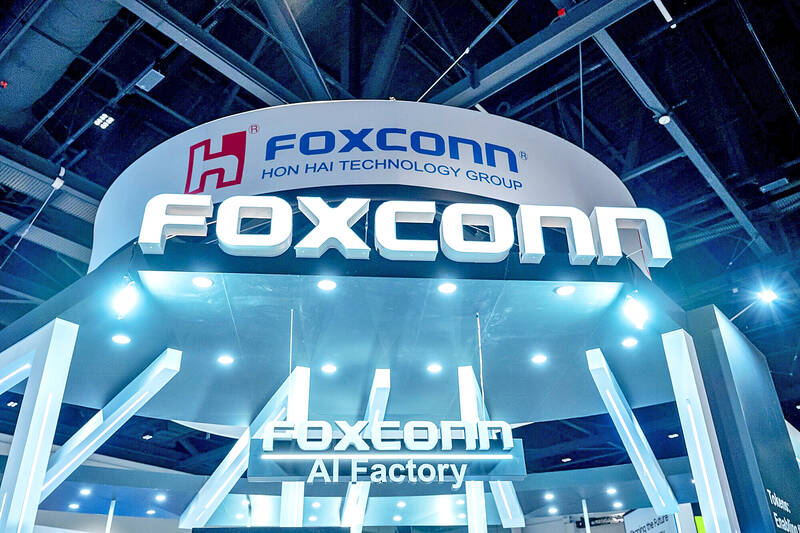Hon Hai Precision Industry Co (鴻海精密), a major iPhone assembler, yesterday reported net profit last quarter grew 91 percent to NT$42.1 billion (US$1.39 billion) from NT$22 billion a year earlier, driven by strong demand for cloud service and computer products.
Earnings per share were NT$3.03, up from NT$1.59 a year earlier, but down from NT$3.34 in the previous quarter. Gross margin last quarter decreased to 6.11 percent, from 6.32 percent a year earlier, while operating margin improved to 2.83 percent from 2.78 percent, the firm said.
First-quarter revenue reached NT$1.64 trillion, up 24 percent from a year earlier, but down 23 percent from the previous quarter — meeting the firm’s March forecast.

Photo: Bloomberg
While revenue from smart consumer products held steady, rather than posting a significant annual growth as expected, artificial intelligence (AI) server revenue last quarter rose more than 50 percent year-on-year, boosted by growing demand from major North American cloud service providers, but fell short of meeting its earlier target to double the figure from a year earlier, Hon Hai chairman Young Liu (劉揚偉) said.
“The main reason is that we began mass production of Nvidia Corp’s GB product lines at the end of the first quarter, but shipments are scheduled for the second quarter, so we expect server revenue to grow next quarter and reach double-digit growth,” Liu said.
The company is accelerating shipments of AI servers, and has developed and shipped several AI servers equipped with application-specific integrated circuits to customers, he said.
AI server revenue in the second quarter is expected to increase significantly, both quarterly and annually, and swell to about NT$1 trillion this year, he said.
Overall, sales this quarter from all business sectors are expected to increase over the previous year and prior quarter, he said.
However, Hon Hai is cautious about the business outlook going forward and has trimmed its full-year revenue outlook from “strong growth,” as stated in March, to “significant growth,” citing uncertainties from US President Donald Trump’s tariff and currency policies as well as a recent sharp appreciation of the New Taiwan dollar against the US dollar, Liu said.
Despite the tariff headwinds, Hon Hai planned its global deployment early, and the effect would be relatively limited, he said, adding that the company has set up 233 plants and offices in 24 countries, including 54 in the Americas, and 12 each in Europe and India, over the past five years.
Regarding its electric vehicle (EV) business, Hon Hai would begin mass production of its Model B vehicles in the second half of this year, while its EV battery plant in Kaohsiung began mass production last quarter to supply products for testing by customers, Liu said.
As for its semiconductor segment, Hon Hai’s silicon carbide (SiC) automotive chips would enter mass production in the second quarter, while its next-generation SiC metal-oxide-semiconductor field-effect transistors are expected to begin mass production in the second half of the year, he said.
In the aerospace sector, the company is continuing to develop drone production technologies and modules, he said.

With an approval rating of just two percent, Peruvian President Dina Boluarte might be the world’s most unpopular leader, according to pollsters. Protests greeted her rise to power 29 months ago, and have marked her entire term — joined by assorted scandals, investigations, controversies and a surge in gang violence. The 63-year-old is the target of a dozen probes, including for her alleged failure to declare gifts of luxury jewels and watches, a scandal inevitably dubbed “Rolexgate.” She is also under the microscope for a two-week undeclared absence for nose surgery — which she insists was medical, not cosmetic — and is

CAUTIOUS RECOVERY: While the manufacturing sector returned to growth amid the US-China trade truce, firms remain wary as uncertainty clouds the outlook, the CIER said The local manufacturing sector returned to expansion last month, as the official purchasing managers’ index (PMI) rose 2.1 points to 51.0, driven by a temporary easing in US-China trade tensions, the Chung-Hua Institution for Economic Research (CIER, 中華經濟研究院) said yesterday. The PMI gauges the health of the manufacturing industry, with readings above 50 indicating expansion and those below 50 signaling contraction. “Firms are not as pessimistic as they were in April, but they remain far from optimistic,” CIER president Lien Hsien-ming (連賢明) said at a news conference. The full impact of US tariff decisions is unlikely to become clear until later this month

GROWING CONCERN: Some senior Trump administration officials opposed the UAE expansion over fears that another TSMC project could jeopardize its US investment Taiwan Semiconductor Manufacturing Co (TSMC, 台積電) is evaluating building an advanced production facility in the United Arab Emirates (UAE) and has discussed the possibility with officials in US President Donald Trump’s administration, people familiar with the matter said, in a potentially major bet on the Middle East that would only come to fruition with Washington’s approval. The company has had multiple meetings in the past few months with US Special Envoy to the Middle East Steve Witkoff and officials from MGX, an influential investment vehicle overseen by the UAE president’s brother, the people said. The conversations are a continuation of talks that

Nintendo Co hopes to match the runaway success of the Switch when its leveled-up new console hits shelves on Thursday, with strong early sales expected despite the gadget’s high price. Featuring a bigger screen and more processing power, the Switch 2 is an upgrade to its predecessor, which has sold 152 million units since launching in 2017 — making it the third-best-selling video game console of all time. However, despite buzz among fans and robust demand for pre-orders, headwinds for Nintendo include uncertainty over US trade tariffs and whether enough people are willing to shell out. The Switch 2 “is priced relatively high”